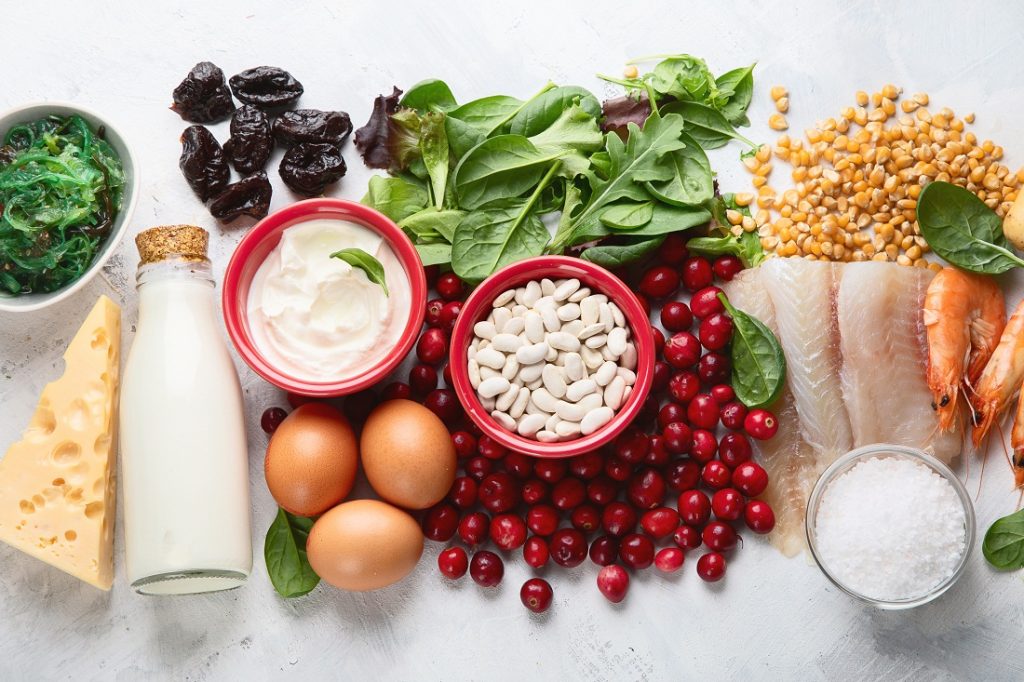Everything you need to know…

Whether this is your first introduction, or you’re simply in need of a quick refresher, consider this your guide to everything you need to know about iodine. Read on for why this trace mineral is so important, how much we need, and our favourite, readily-available sources of iodine to include in your diet.
Why is iodine so important?
Iodine is an essential trace mineral for healthy thyroid function and metabolism, at every age. It’s particularly important during preconception, pregnancy and breastfeeding. Adequate iodine intake supports sufficient thyroid hormone production throughout the entire pregnancy, to support foetal brain and nervous system development and reduce the risk of pregnancy complications.
How much iodine do I need?
You might be surprised to learn that more iodine is not necessarily better! Instead – much like Goldilocks – the thyroid gland likes just the right amount of iodine to allow it to function optimally. Common signs and symptoms of iodine deficiency – and thyroid underactivity – include weight gain, fatigue, persistently feeling cold (even in warm temperatures), dry skin, and hair loss. Meanwhile, excess iodine intake can disrupt thyroid function – causing either under- or over-activity – and may also cause abdominal pain, nausea and vomiting.
If you’re experiencing symptoms that might indicate iodine deficiency, such as hair loss or low energy, it’s important not to self-prescribe supplements as it’s easy to overdo iodine intake. Instead, seek the support of an Accredited Practising Dietitian, who can review your dietary intake as a whole and help you identify other possible factors (there could be many!) behind your symptoms.
Importantly, iodine is needed in greater amounts by women and people assigned female at birth who are trying to conceive, pregnant or breastfeeding. The best way to ensure you’re getting enough iodine – alongside other, critical nutrients – during this time is to work with an Accredited Practising Dietitian for holistic dietary support throughout your pre-conception, pregnancy and post-partum journey.
Dietary sources of iodine
As iodine is abundant within sea water, rich sources include seaweeds and seafood. The iodine content of foods grown on land is dependent on iodine levels within the soil, which varies dramatically. In Australia, the iodine levels in our soil are quite poor. This resulted in the mandatory fortification of iodine in commercially-produced bread in Australia and New Zealand, since 2009. This has helped to dramatically reduce rates of iodine deficiency in Australia and New Zealand.
- Iodised salt. Switching to iodised salt is an easy way to include iodine in the diet. The rise of popularity of Himalayan pink salt has been a key contributing factor to poor iodine status in Australia. When using salt, it should always be iodised.
- Conventionally-produced breads. Although commercial breads must be produced with iodised salt in Australia and New Zealand, the same mandate does not extend to gluten-free, no-added-salt and organic breads. The avoidance of bread and rise in popularity of gluten-free products has also contributed to poor iodine status in Australia.
- Seaweed. Kelp, wakame, dulse and nori – delicious in sushi and soups – are all naturally rich in iodine. Meanwhile, seaweed products like those from Alg Seaweed can be used to season anything from eggs and avocado to roasted vegetables, and are an easy, tasty way to boost both flavour and iodine intake.
- Seafood. Shellfish varieties including mussels, oysters and scallops, as well as fish, including tinned salmon, are particularly rich sources of iodine.
- Dairy. Dairy products such as yoghurt, milk and cheese are all good sources of iodine. The avoidance of dairy products has also contributed to poorer iodine levels in Australia.
- Eggs. Eggs are a nutrient powerhouse that include iodine – a delicious way to boost your iodine level – perfectly paired with a pinch of iodised salt and wholegrain toast!
For expert dietary support to support you on your personal health journey, book your first appointment with one of our wonderful Accredited Practising Dietitians today.
Written by Caitlin Branch, Student Nutritionist, and Amanda Smith, Accredited Practising Dietitian.
References
Braun, L., and Cohen, M. (2017). Essential herbs and natural supplements. Elsevier Australia.
Paxton, F. (2015). Foundations of naturopathic nutrition: A comprehensive guide to essential nutrients and nutritional bioactives. Routledge.
